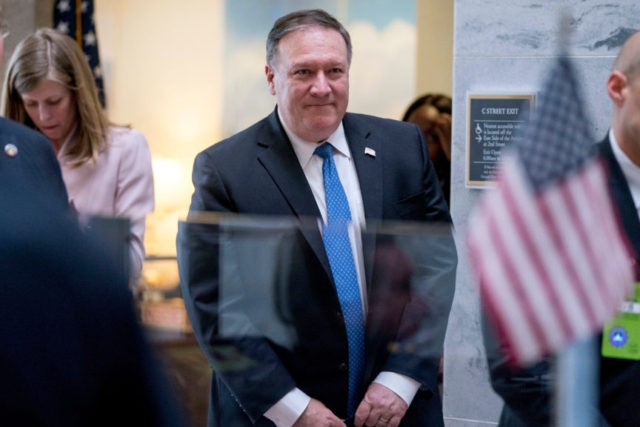WASHINGTON (AP) — Mike Pompeo, the former congressman-turned-CIA director chosen to be secretary of state vowed Thursday to make the State Department as central to national security decisions as the CIA, drawing a sharp contrast with his ousted predecessor, Rex Tillerson.
In his Senate confirmation hearing, Pompeo lamented the “demoralizing” vacancies at the top echelons of the State Department that became a notorious hallmark of Tillerson’s tenure. He said he planned to fill those vacancies, and asked for the Senate’s help to get key positions confirmed.
Pompeo cast his close connection to the president as an advantage that would help him restore the significance of the State Department that waned during the first year of Trump’s administration and drew alarm from lawmakers of both parties.
“My relationship with President Trump is due to one thing: we’ve demonstrated value to him at the CIA. So, in turn, he has come to rely on us,” Pompeo said. “I intend to ensure that the Department of State will be just as central to the president’s policies and the national security of the United States.”
Pompeo’s remarks before the Senate Foreign Relations Committee were the first chance for lawmakers and the public to hear directly from the former Kansas congressman about his approach to diplomacy and the role of the State Department, should he be confirmed to lead it. Pompeo’s views on global issues are well known — he was questioned extensively by senators for his confirmation to run the CIA — but Democratic senators have raised questions about his fitness to be top diplomat, given his hawkish views and past comments about minorities.
Since being nominated last month, Pompeo has spent much of his time at the State Department immersing himself in briefing books and undergoing mock hearings and prep meetings on key issues like Iran, Syria and North Korea, as well as the inner workings of the State Department, a person close to Pompeo said. He’s also spoken to all eight living former secretaries — including Hillary Clinton, whom he famously criticized over the 2012 attack on U.S. facilities in Benghazi, Libya.
Pompeo’s chief goal Thursday is to convince senators that he intends to strengthen the State Department and re-establish its relevance as a major player in national security policy, said the individual, who wasn’t authorized to comment by name and requested anonymity.
That message is an implicit contrast with Tillerson, who left scores of top positions unfilled and the diplomatic corps dispirited before being unceremoniously fired by Trump on Twitter in March. Pompeo will tell the Senate that as he met with State Department workers recently, every single one told him he or she wanted to be “empowered in their roles” and clear about Trump’s mission.
Trump announced Pompeo’s nomination to become the 70th secretary of state in the same March 13 tweet in which he dumped Tillerson. “He will do a fantastic job,” Trump said at the time, confirming months of speculation that the largely sidelined Tillerson was out of a job and would be replaced by Pompeo, who is known to have the president’s ear and respect and shares his opposition to the Iran nuclear deal.
At the State Department, the shake-up was met with a mixture of relief and trepidation.
On the one hand, Tillerson had alienated many with his deeply unpopular bureaucratic reorganization. His overt endorsement of hefty budget cuts and his failure to fill jobs attracted the ire of lawmakers of both political parties.
But many diplomats have privately voiced apprehension about Pompeo’s history of sometimes hostile comments toward the gay community and Islam and his fierce criticism of the Obama administration’s handling of the aftermath of the Benghazi attacks.
Pompeo, who was confirmed for the CIA job by a 66-32 vote, developed a reputation for being more outwardly political than many past directors of the traditionally apolitical agency. He developed a visibly close relationship with the president, traveling to the White House on most days to deliver the highly classified President’s Daily Brief in person rather than leaving the task to other intelligence officials. Often Trump would have the CIA director stay in the West Wing after the briefing to accompany him to other meetings.
___
Associated Press writer Matthew Pennington contributed to this report.

COMMENTS
Please let us know if you're having issues with commenting.